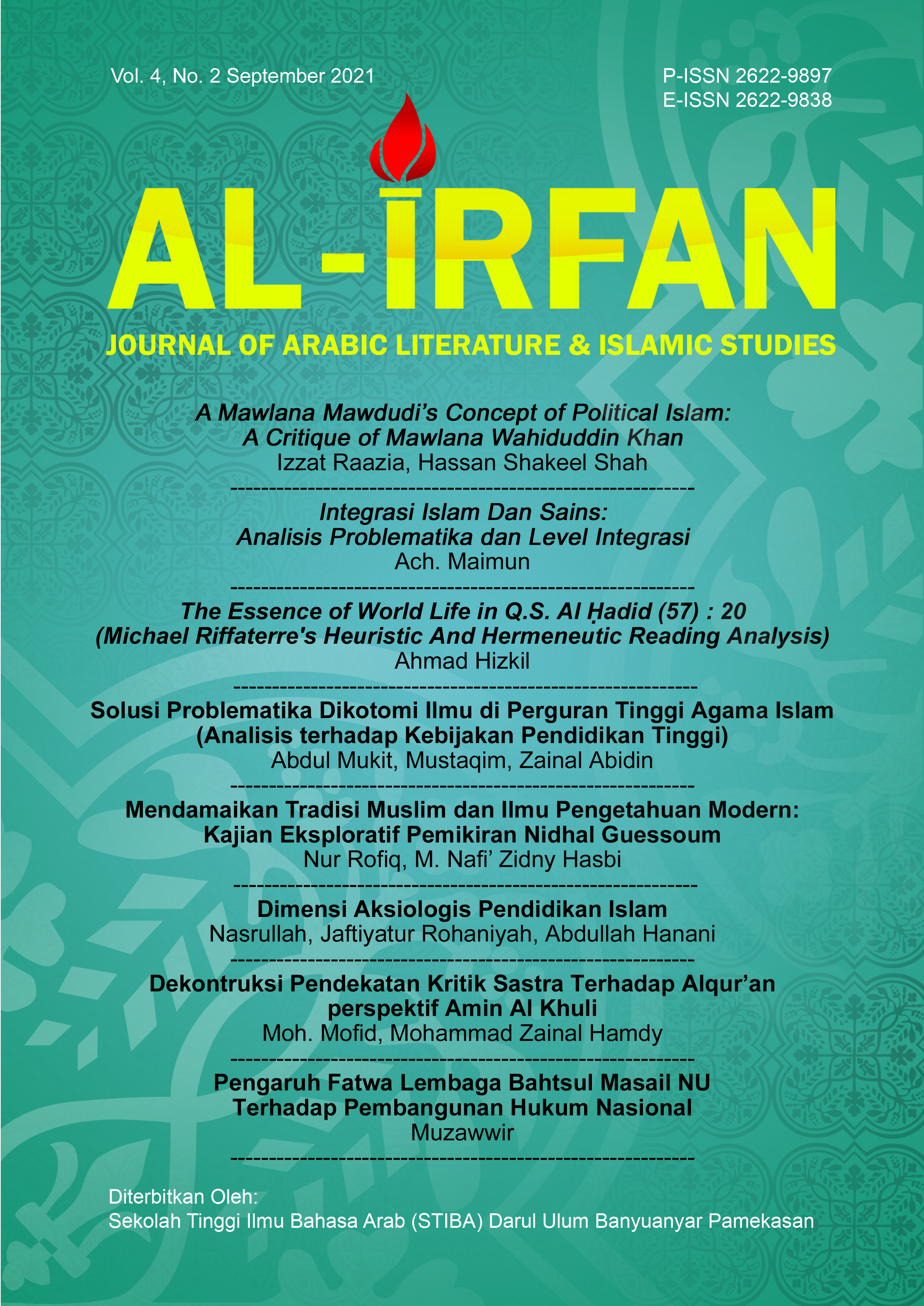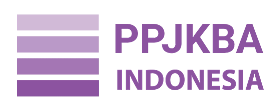Dimensi Aksiologis Pendidikan Islam
DOI:
https://doi.org/10.36835/alirfan.v4i2.4999Kata Kunci:
Axiology, ethic, aesthetic, Islamic EducationAbstrak
Axiology is a theory about a value, benefit or everything that is known. Axiology divided into two parts, namely ethic and aesthetic. The ethics are divided into two parts, the first is descriptive ethics and the second is normative ethics, as well as Aesthetics, there are two parts of Aesthetics, the first is Descriptive Aesthetics and the second is Normative Aesthetics. While the source of value has two parts, namely, divine values and Inaniyah values. Characteristics and value levels are also divided into two, namely objective or subjective values and absolute or changing values. In the essence of value, there are important points such as: the value of life, the value of enjoyment, the value of usability, the value of intellectuals, the value of ethics, the value of aesthetics, and the value of religion. Islamic education has a goal, namely to make students as human beings who develop towards a better and become ethical human beings and have a personality that is in accordance with Islamic teachings, both in terms of spiritual, scientific, scientific, both individually and collectively. Values are closely related to Islamic education because Islamic education is a process of achieving perfection in terms of the ability of students in accordance with Islamic teachings.Referensi
Abadi, Totok Wahyu. “Aksiologi: Antara Etika, Moral.†Kanal (n.d.). https://ojs.umsida.ac.id?index.php/kanal.
Ali, Mohammad Daud. Pendidikan Agama Islam. Jakarta: Rajawali Press, 2013.
Daulay, Haidar Putra. Pendidikan Islam Dalam Perspektif Filsafat. Jakarta: Kencana Prenada Media Group, 2014.
Dkk, I Dewa Gede. Filsafat Ilmu (Dari Pohon Pengetahuan Sampai Karakter Keilmuan Ilmu Hukum). Malang: Madani, 2014.
Hamdy, Mohammad Zainal. “Telaah Kembali Pemahaman Sistem Ketatanegaraan Dalam Islam ( KHILAFAH ) ( Kajian Historis Dan Ideologis Terhadap Gerakan HTI Di Indonesia ).†Syaikhuna: Jurnal Pendidikan dan Pranata Islam 11, no. October (2020): 158–172.
Khorofi, Moh. “Dimensi Aksiologi Pendidikan Islam.†IAIN MADURA, n.d.
Khotimah, Indah Husnul. “Dimensi Aksiologis Pendidikan Islam.†Accessed September 27, 2021. https://www.researchgate.net/publication/329528105.
Mahfud. Mengenal Ontologi, Epistemologi, Aksiologi Dalam Pendidikan Islam. Bawean: STAI Hasan al-Jufri, n.d.
Ningsih, Elok Setia. “Estetika Dan Pendidikan.†IAIN Kediri, 2014.
Rachmat, Aceng. Filsafat Ilmu Lanjutan. Jakarta: Kencana Prenada Media Group, 2011.
Rohmaniyah, Istighfaratur. Pendidikan Etika, Konsep Jiwa Dan Etika Perspektif Ibnu Miskawaih Dalam Kontribusinya Dalam Pendidikan Islam. Malang: UIN Maliki Press, 2010.
Salam, Burhanuddin. Logika Materil Filsafat Ilmu Pengetahuan. Jakarta: Rineka Cipta, 1997.
Salim, Agus. “Kajian Tentang Aksiologi Pendidikan Islam.†Last modified 2015. https://isabela-agus.com.
Siswanto. Filsafat Dan Pemikiran Pendidikan Islam. Surabaya: Pena Salsabila, 2017.
Suharto, Toto. Filsafat Pendidikan Islam (Menguatkan Epistimologi Islam Dalam Pendidikan). Yogyakarta: Ar-Ruzz Media, 2014.
Surajiyo. Filsafat Ilmu Dan Perkembangannya Di Indonesia. Jakarta: Bumi Aksara, 2007.
———. Ilmu Filsafat Suatu Pengantar. Jakarta: Bumi Aksara, 2014.
Suriasumantri, Jujun S. Filsafat Ilmu Sebuah Pengantar Populer. Jakarta: Pustaka Sinar Harapan, 1990.
Susanto, A. Filsafat Ilmu (Suatu Kajian Daam Dimensi Ontologis, Epistimologis, Dan Aksiologis). Jakarta: Bumi Aksara, 2016.
Tafsir, Ahmad. Filsafat Pendidikan Islami, Integrasi Jasmani, Rohani, Dan Kalbu, Memanusiakan Manusia. Bandung: PT. Remaja Rosda Karya, 2012.
“Kompas.†Accessed September 13, 2021. www.kompasiana.com.
“Pengertian-Aksiologi-Aspek-Menurut-Para-Ahli.†Accessed September 13, 2021. https://pendidikan.co.id.
##submission.downloads##
Diterbitkan
Cara Mengutip
Terbitan
Bagian
Lisensi
Hak Cipta (c) 2021 Al-Irfan : Journal of Arabic Literature and Islamic Studies

Artikel ini berlisensi Creative Commons Attribution 4.0 International License.
Lisensi :
Al-Irfan: Journal of Arabic Literature and Islamic Studies is published under conditions Creative Commons Attribution 4.0 International License / CC BY 4.0 This license permits anyone to copy and redistribute this material in any form or format, modify, modify, and make derivative works of this material for any purpose, including commercial purposes, so long as they credit the author for the original work.











